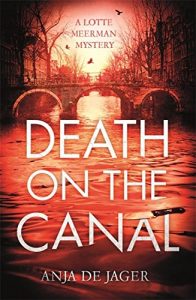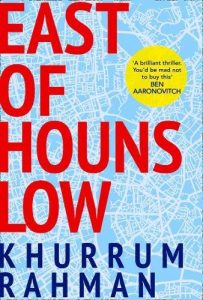 Death on the Canal by Anja de Jager
Death on the Canal by Anja de Jager
Published by Constable
The Mountain by Luca D’Andrea
Published by Maclehose
East of Hounslow by Khurrum Rahman
Published by HQ
She’s Not There by Joy Fielding
Published by Bonnier Zaffre
Christmas is a time for families and this month’s crime novels are all about families at their best and their worst. Anja de Jager puts her series character, Detective Lotte Meerman, through yet another emotional wringer in Death on the Canal. This time she witnesses a murder, while having a drink with the man she loves and longs for and with whom she cannot communicate well enough to maintain a relationship. Her colleagues are sure this is an ordinary killing of a small-time drug dealer, but Lotte resists the pressure to go along with them. As she digs, she uncovers unhappy family secrets that bring her own sorrows back to haunt her. But, as every series detective must, she fights herself, her colleagues, and the villains and emerges with the truth. De Jager is Dutch but writes in English. The occasional stiffness of the  language suits its Amsterdam setting.
language suits its Amsterdam setting.
From Holland in a sweat-inducing heatwave, we move to biting cold in the Alto Adige in the Italian Tirol for Luca d’Andrea’s first novel. Jeremiah Salinger, the first-person narrator, is a New York documentary script writer of German descent, now living in the mountain village of Sibenhoch with his wife, Annelise, and their daughter, Clara. Salinger can never resist a potential story and when he sees a mountain-rescue helicopter and hears about the history of the team from his father-in-law, who set it up, he has to devise a film of their exploits. His involvement leads to tragedy for some of the mountain men and post-traumatic stress disorder for himself. Annelise begs him to give her a year’s sabbatical, during which he will heal and live and take on no more work. But he is a true addict and stories keep presenting their temptations to him. The most dramatic is the one from thirty years ago, when three students were murdered and grotesquely mutilated on the most dangerous of the local mountains. Everyone in the village knows everyone else and many of them tell Salinger about the awful consequences of the murders for the victims’ families, for the men who found them (including Salinger’s father-in-law) and for their families, too, begging him not to carry on with his quest.
D’Andrea brilliantly evokes the grandeur and terror-inducing dangers of the mountains, and the scale of his story seems enormous as it unfolds, tackling everything that guilt and fear and longing  can do to the human mind. Threaded through all the grimness and the heroism is the simple but crucial message that when you love someone you have to discover the story that made them who they are before the love can be fulfilled.
can do to the human mind. Threaded through all the grimness and the heroism is the simple but crucial message that when you love someone you have to discover the story that made them who they are before the love can be fulfilled.
The writing and Howard Curtis’s unobtrusive translation suit the drama of the ice-ravaged landscape in which Salinger plays with his own mind and the lives of his friends and family. This is an exciting and powerful novel.
Khurrum Rahman injects welcome wit into his first novel, East of Hounslow, which takes Jay – Javid Qasim – from a fairly easy life of drug-dealing in Hounslow and puts him into the manipulative grip of both MI5 and a group of fanatical jihadists. Jay’s family, his religion, and his various friends threaten to pull him apart, like some Procrustean bed. Funny, alarming, and tragic, East of Hounslow is said to be only the first of a trilogy. The next two parts cannot come soon enough for me.
Joy Fielding’s heroine, Caroline Shipley, is a controlling maths teacher with a failed marriage and a difficult relationship with her teenage daughter Michelle. Far more important than either is the  disappearance during a family holiday in a Mexican resort fifteen years ago of her younger daughter, Samantha. Every year since then, journalists have besieged Caroline and innumerable people have contacted her claiming to have seen Samantha or even to be Samantha, which is why a breathless phone call from a young woman who says, ‘I think I’m your daughter’ seems no more than yet another burden for her to carry. But something about this particular claim makes Caroline want to meet the young woman. She turns out to be adorable, but that’s not enough. She volunteers to take a DNA test.
disappearance during a family holiday in a Mexican resort fifteen years ago of her younger daughter, Samantha. Every year since then, journalists have besieged Caroline and innumerable people have contacted her claiming to have seen Samantha or even to be Samantha, which is why a breathless phone call from a young woman who says, ‘I think I’m your daughter’ seems no more than yet another burden for her to carry. But something about this particular claim makes Caroline want to meet the young woman. She turns out to be adorable, but that’s not enough. She volunteers to take a DNA test.
The narrative of the investigation is intercut with scenes from the beach resort before Samantha disappeared, revealing tricky relationships between Caroline, her husband and their friends and relations. Caroline’s mother still treats her appallingly, as does her ghastly ex-husband, and her over-controlled chilliness soon becomes understandable. The selfishness of those who think their own unhappiness justifies anything is laid bare in all its cruelty, and it seems unlikely that poor Caroline will see a happy ending. With echoes of several real cases from the last few decades, She’s Not There is both convincing and involving.
